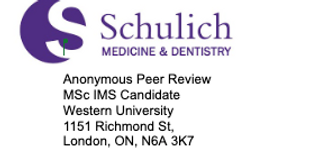Communicating Science in the 21st Century
M.Sc Interdisciplinary Medical Science 9501
Course Description As Taken From Syllabus:
Communication is an essential component of scientific research. This course will discuss different types of oral and written scientific communication and how to effectively communicate to different audiences. Examples of the types of communication discussed will include proposals, abstracts, papers, and posters. Students will compare scientific and lay communication and learn how to identify an audience and target communication accordingly. The publication process will be discussed in detail so that students have a better appreciation of the steps involved and the length of the process. Students will also learn about more recent forms of dissemination such as pre-prints and they will evaluate the strengths and weaknesses of this form of communication. Lastly, students will learn about how social media is used to communicate science.
Learning Objectives:
-
Use different types of oral and written scientific communication to communicate with different audiences
-
Develop an understanding of the scientific publication process including peer-review
-
Evaluate recent forms of scientific communication including pre-prints and the use of social media
Course Artifacts
These are some of the works I have produced in this course. Click on the button to view the entire project!

This assignment required the creation of a grant brief that included a lay summary, a visual abstract, and sections on opportunities for training highly qualified personnel (HQP) and incorporating sex and gender-based analysis (SGBA). The lay summary explained the research in non-technical language, while the visual abstract provided a graphical representation of the project. The HQP section highlighted potential training opportunities within the research, and the SGBA section detailed how sex and gender considerations would be integrated into the study. The brief was designed to communicate the research's significance to a broad audience.

In my 3-minute microteach on the Kailasa Temple in Maharashtra, India, I spontaneously engaged the audience by using strong eye contact, dynamic body language, and storytelling techniques. I brought the temple's history and architectural brilliance to life, describing how this monolithic structure was carved from a single rock, highlighting the extraordinary craftsmanship of ancient Indian artisans. Through vivid descriptions and an energetic delivery, I aimed to captivate the audience, making the grandeur and cultural significance of the temple resonate with everyone present.

My grant peer revision letter provided a respectful and thorough review of a colleague's grant proposal. I began by acknowledging and commending the strengths of the proposal, highlighting the well-articulated research objectives and the clarity of the lay summary. I then offered constructive feedback on areas for improvement, such as enhancing the visual abstract for better clarity and suggesting more detailed incorporation of sex and gender-based analysis (SGBA). Throughout the letter, I maintained a professional and supportive tone, ensuring my feedback was both helpful and encouraging for the proposal's development.

In my response letter, I demonstrated my ability to receive and thoughtfully engage with professional feedback. I acknowledged the constructive critiques provided and expressed appreciation for the insights shared. I carefully dissected each point of feedback, recognizing areas where I could refine my work and identifying opportunities for personal growth. My response highlighted my commitment to continuous improvement and my openness to learning from others, ultimately using the feedback as a tool for enhancing both my current project and my overall professional skills.
Reflection
Reflecting on the assignments involving grant briefs, debates, and professional letters, I have gained a profound appreciation for effective communication in science. Crafting grant briefs taught me to distill complex ideas into clear, compelling narratives for diverse audiences. Participating in debates enhanced my ability to present and defend scientific arguments while writing professional letters underscored the value of constructive feedback. These experiences highlighted the importance of both giving and receiving feedback for personal and professional growth, reinforcing that clear communication and constructive critique are essential for advancing research and fostering collaboration. They have equipped me with valuable skills for articulating ideas, addressing challenges, and driving impactful change in the scientific community.
